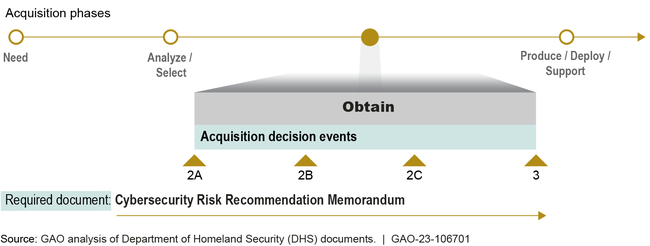DHS Annual Assessment: Major Acquisition Programs Are Generally Meeting Goals, but Cybersecurity Policy Needs Clarification
Fast Facts
This is our 8th annual assessment of the Department of Homeland Security's major acquisition programs. These programs acquire systems for operations like securing the border, screening travelers, and improving disaster response.
We found that 18 of the 25 programs we reviewed were meeting their cost and schedule goals by the end of FY 2022. DHS also requires programs to identify their cybersecurity risks in a memo. However, none of the 7 programs we reviewed had done so because they didn't think this requirement applied to them.
We recommended that DHS clarify which programs need to provide these memos.

Highlights

What GAO Found
The Department of Homeland Security (DHS) invests billions of dollars annually to acquire systems that help secure the border, advance marine safety, screen travelers, improve disaster response, and execute a wide variety of other operations.
Most Programs Met Established Cost and Schedule Goals in Fiscal Year 2022
As of September 2022, 18 of the 25 selected DHS acquisition programs that GAO reviewed had a department-approved acquisition program baseline—a summary of measurable estimates indicating how the system will perform, when it will be delivered, and what it will cost. Most of the other programs were not yet required by policy to have an approved program baseline.
Of these 18 programs, three started the fiscal year either behind their approved schedule or over their approved budget, putting them in breach status. However, all three completed the process needed to get back on track, including revising their baseline estimates. By the end of fiscal year 2022, those programs met their revised cost and schedule goals. Four other programs also revised or were revising their baselines in fiscal year 2022 due to changes in the projects' scope, such as a change in the quantity being acquired.
In addition, eight of the 25 DHS acquisition programs completed the operational test and evaluation phase of the acquisition process during fiscal year 2022, according to a DHS official. After completing operational test and evaluation, those programs are on track to begin production and deliver new capabilities.
Five Programs Sought COVID-19 Baseline Adjustments
COVID-19 affected some of the 25 major acquisition programs GAO reviewed in a variety of ways, including supply chain issues and inflation. As of September 2022:
Five programs were seeking approval to adjust their schedule or cost baselines due to COVID-19 effects. These programs have requested flexibilities offered in a July 2022 DHS memorandum to address the effects of COVID-19.
Five other programs reported COVID-19 cost or schedule effects in fiscal year 2022, but were able to manage them within their baselines.
The remaining 15 programs did not report schedule or cost effects related to COVID-19.
Selected Programs Have Not Prepared Cybersecurity Memorandums Ahead of Acquisition Decision Events
In addition, since the department's acquisition cybersecurity instruction was issued, none of the seven programs that had subsequent acquisition decision events completed a cybersecurity risk recommendation memorandum (CRRM). The instruction requires that major acquisition programs consider cybersecurity throughout the acquisition life cycle. Specifically, major acquisition programs are required to present a CRRM at acquisition decision events to identify the programs' cybersecurity status and their risk recommendation (high, medium, low).
Cybersecurity Risk Recommendation Memorandum Required in the Acquisition Life Cycle

DHS officials told GAO that a CRRM was not applicable to them for various reasons. In one instance, a program provided documentation that this requirement was waived by DHS. The other six programs reported that other documentation was used instead, that the memorandum was not applicable to their program, or that they simply did not develop one. The instruction does not clarify when the CRRM requirement might be waived, is not applicable, or when or what other documentation may be used in its place. If DHS does not clarify when exemptions apply, programs may not prepare the memorandums when they are needed. As a result, DHS, in its oversight role, may not have information to effectively assess cybersecurity risk and ensure that risk mitigations are adequate.
Why GAO Did This Study
To help execute its many critical missions, DHS plans to spend more than $4 billion on its portfolio of major acquisition programs—those with life-cycle costs over $300 million—in fiscal year 2023.
For some DHS major acquisition programs, COVID-19 or changes implemented to address it have affected workforce availability or led to supply chain issues. In addition, DHS's major acquisition programs increasingly rely on software and IT systems, and cyberattacks can target any IT system.
The Explanatory Statement accompanying the DHS Appropriations Act, 2015, included a provision for GAO to review DHS's major acquisitions on an ongoing basis.
This report, GAO's eighth review, assesses the extent to which selected programs are (1) meeting baseline goals, (2) mitigating COVID-19 effects on delivery of capabilities, and (3) executing cybersecurity activities.
This is a public version of a sensitive report that issued in March 2023. Information that DHS deemed sensitive has been omitted.
How GAO Did This Study
GAO assessed 25 major acquisition programs, including DHS's largest programs and those that GAO or DHS identified as at risk of poor outcomes to determine program status as of September 30, 2022. GAO assessed their progress in meeting cost, schedule and performance goals; and reviewed policy, memorandums, and information about the cost and schedule effects of COVID-19. GAO also reviewed DHS acquisition cybersecurity policy and assessed programs' cybersecurity risk management activities; and interviewed DHS officials.
Recommendations
GAO is recommending that, as DHS updates its Instruction 102-01-012, it clarifies which major acquisition programs are required to have completed cybersecurity risk recommendation memorandums prior to acquisition decision events, and when exemptions apply. In the sensitive version of this report, GAO made one additional recommendation to DHS.
Recommendations for Executive Action
| Agency Affected | Recommendation | Status |
|---|---|---|
| Department of Homeland Security | The Secretary of Homeland Security should ensure that, as the department updates its Instruction 102-01-012, it clarifies (1) which major acquisition programs are required to have completed cybersecurity risk recommendation memorandums prior to acquisition decision events, and (2) when exemptions apply. |
The Department of Homeland Security (DHS) concurred with the recommendation. In January 2023, DHS added the completion of cybersecurity risk recommendation memorandums as a required document for all major acquisition programs to DHS instruction 102-01-001, DHS's primary acquisition management instruction. This instruction notes that the memorandums ensure compliance with DHS instruction 102-01-012, a policy about cybersecurity throughout the acquisition lifecycle framework. In April 2025, DHS's Office of Program Accountability and Risk Management said they plan to specify which major acquisition programs require the memorandums and when exemptions apply in their revision of the instruction. DHS plans to complete the revision in December 2025.
|
